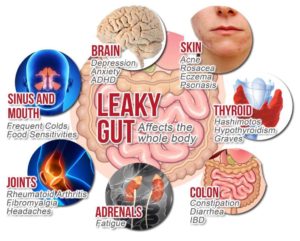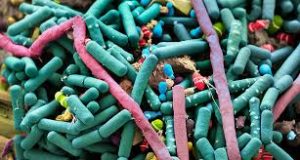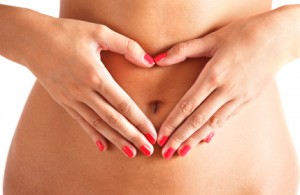Digestion plays a role in the health of virtually every body system. 70% of your immune system cells reside in the gut wall. Gut and digestive health are important for all couples trying to conceive.  Enhancing digestion can greatly aid men and women with fertility concerns. An improvement in gut health may be the missing link to solving otherwise unexplained fertility. Optimal fertility and gut health are closely related. Do you have digestive problems? Hopefully this information will help and pave the way for relief and new power over your fertility.
Enhancing digestion can greatly aid men and women with fertility concerns. An improvement in gut health may be the missing link to solving otherwise unexplained fertility. Optimal fertility and gut health are closely related. Do you have digestive problems? Hopefully this information will help and pave the way for relief and new power over your fertility.
How Does Digestion Impact Fertility?
Your digestive system breaks down food, absorbing and producing nutrients, and eliminating toxins that affect fertility. A healthy digestive system ensures your body is assimilating crucial nutrients for reproductive health. You body can’t absorb what it doesn’t absorb!
Poor gut health and digestion is a common cause for nutrient deficiencies, mineral imbalance and inflammation. Poor digestion can also impact your hormone levels. Your absorption of fat is especially important for reproductive health. Essential fatty acids form the building blocks for hormone production and support normal inflammatory response to the body.
Poor digestion can decrease the elimination of harmful xenoestrogens or excess estrogen that can affect fertility. It can depress thyroid function, a known fertility blocker. Gut bacteria are involved in converting T4 to T3 for thyroid hormone synthesis. A 2014 research study reveals that there may be a link between hypothyroidism and SIBO (small intestine bacterial overgrowth).
We all suffer from occasional digestive upset from a day of poor food choices, high stress or minor illness. It’s important to take digestive symptoms seriously if they’re frequent or chronic.
Signs your digestion needs some TLC:
- Excess bloating, gas
- Heartburn/belching
- Digestive pain, loud gurgling or spasms
- Nausea/vomiting
- Diarrhea and/or alternating constipation
- Messy or greasy stools (a sign of poor fat absorption)
- Blood in the stools (may be related to an ulcer or hemorrhoids)
- Frequent skin problems like eczema or dermatitis
- Candida yeast infections (imbalanced yeast in the digestive tract)
- Signs of leaky gut (food allergies, mind fog and autoimmune reactions)
- History of gallbladder problems (can often be traced back to wheat or dairy allergy)
What is the Microbiome?
The digestive system is home to 500 different species of bacteria (microbiome). The microbiome of the digestive  system weighs around 3 pounds! It must maintain a very delicate balance of the right types of bacteria to ensure proper gut functioning.
system weighs around 3 pounds! It must maintain a very delicate balance of the right types of bacteria to ensure proper gut functioning.
What Imbalances Your Microbiome?
A poor diet is a major factor. A lack of fiber, too much sugar, and processed foods alter your gut bacteria in favor of harmful microbes. This leads to dysbiosis and/or candida yeast overgrowth. Further, certain medications can affect your microbiome – some of the worst are antacids, antibiotics, antifungal medications oral contraceptives.
Adjusting or changing a problem medication with the help from your doctor can help turn around some digestive problems. A good option for women seeking to get off hormonal contraceptives is charting your cycle. For help with this, contact us and we can get you started.
The Role of Digestion in Immunological Infertility
Immunological Infertility is a confusing and heartbreaking problem. How does your body decide to fight against what you want so badly? For some the answer may lie in their gut health. Leaky gut syndrome is a frequent contributor to autoimmune and allergy reactions. If the gut wall becomes permeable related to allergies, poor enzyme activity or certain medications, it leads to a cascade of harmful events.
Toxins are allowed to pass through the gut wall into the bloodstream, creating inflammation and pulling the immune system from its normal tasks. Undigested proteins also slip through the gut wall, again triggering immune response, inflammation and reactions to substances that wouldn’t normally be harmful. As the syndrome progresses, the body may react to nearly all foods, creating a weakened system, where fertility is unlikely to thrive.
If you suspect poor gut health may be a factor in an immune related fertility problem, there is so much you can do to improve your digestion. You can even restore the integrity of the gut lining naturally.
How to Restore Gut Health and Normal Digestion for Your Fertility
Part 1. Cleanse
Start with a gentle cleanse. Try a 24-hour juice fast to help clear toxins clogging the digestive tract. A few tips:
- Have a mixed vegetable juice 3 times a day. Use carrots, beets, dark greens, cucumber, celery or the veggies of your choice.
- Eat crunchy vegetables or organic apples to help you feel full while promoting cleansing.
- Enjoy herbal teas ad infusions throughout the day.
- Finish your cleanse with a nutritional yeast or miso broth in the evening. Add a little onion, garlic or organic shiitake mushrooms for extra benefits.
- Drink plenty of water during your cleanse. It’s the key to feeling your best while promoting natural detoxification.
Note: Stick to a short cleanse for the best results to start with. Try this 24-hour juice cleanse, work to rebalance the microbiome and then consider a Fertility Cleanse. Longer cleanses can be counterproductive, especially if the body is weakened from illness or poor nutrient absorption. We can help with the process – contact us for help.
Part 2. Rebalance and Rebuild
- Follow a Fertility Diet! (contact us for this info!) Eliminate or reduce your consumption of processed foods, which disrupt microbiome. Eliminate refined sugar and gluten foods — common triggers for allergies, inflammation and imbalanced immune response.
- Focus on cultured/fermented foods. Organic yogurt or kefir, kombucha or raw Sauerkraut promote the growth of healthy bacteria in the gut and vagina. Add prebiotic foods, which act as a food source for healthy bacteria. Some good choices: Jerusalem artichoke, endive, garlic and onions.
- Eat fiber! Include more high fiber foods like broccoli, artichoke and quinoa to keep digestion strong. More fiber in your diet also helps eliminate toxins and excess estrogen.
- Take herbal bitters before meals. It’s amazing how big of a difference this one change can make. Herbal bitters stimulate the natural production of Hcl (hydrochloric acid) in the stomach. Hcl improves nutrient absorption, and reduces bloating, heartburn and gas. While there are many, common bitters are Dandelion, Yellow Dock, Gentian.
- Control this unwanted symptom. If you have painful gas after meals, have a cup of Spearmint or Peppermint tea. All species of mint have carminative action. This means they allow trapped gas to pass more easily and with less discomfort.
- Learn about mucilaginous herbs. To support gut lining integrity, try mucilaginous herbs. Mucilaginous herbs soothe and coat the mucus membranes. A few of the best mucilaginous herbs for digestion are: Marshmallow, Licorice, Slippery Elm bark. These herbs can be taken as teas, extracts or in capsules. Just add a handful or two of dried slippery elm bark and add hot water (like you would oatmeal). Add a dab of honey or cinnamon to taste. It’s easy to digest for almost everyone.
- Try L-glutamine. For long-term leaky gut syndrome, consider the amino acid, L-glutamine. L-glutamien promotes the regeneration and repair of cells in the intestinal lining. Similar to mucilaginous herbs, L-glutamine coats the intestinal wall, helping to re-establish a barrier, so proteins or invaders can’t pass into the bloodstream. A good daily dosage: 2 to 5 grams daily.
Healthy digestion means a healthy, more fertile body!
Digestion plays a huge role in your health and fertility. These suggestions can help turn around your digestive health, even if you have been suffering for a long time.
Also, use stress relief therapies. Many of us eat on the run or when we’re stressed. This upsets healthy digestion. Think of eating under stress as another way of swallowing your feelings. Your digestion and gut health suffers in the end. Try to eat when you’re relaxed. Eat mindfully. Chew your food and take time to savor the nutrients you are eating. This is just as important as any other change you make.
Don’t ignore digestive concerns while working on your fertility. We are here for you if you have questions or would like help. Feel free to contact us at any time for solving this puzzle and getting you on your way to feeling better. For more info on fertility services ![]() here.
here.





